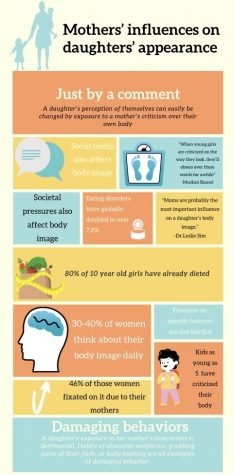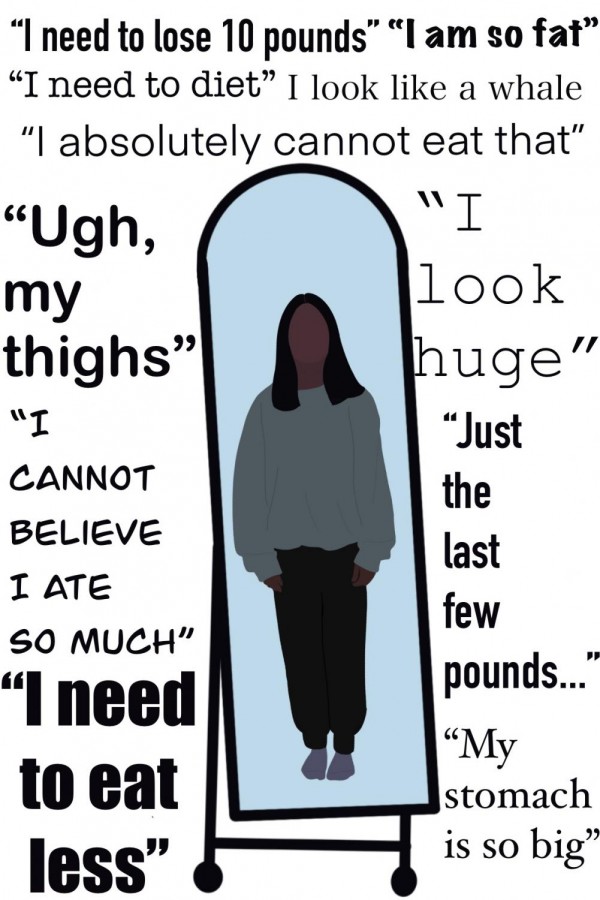Today, the unrealistic body image expectations which young women strive for are often credited to the rise of social media. However, the number one cause of body image issues in adolescent girls is not societal pressures, but rather, their own mothers.
 Besides the biological influence that mothers have on their daughters’ appearances, the way in which mothers discuss their own appearance in front of their daughters notably impacts the way their daughters perceive themselves.
Besides the biological influence that mothers have on their daughters’ appearances, the way in which mothers discuss their own appearance in front of their daughters notably impacts the way their daughters perceive themselves.
While there are several other reasons for girls to have body image issues, an article by the Wall Street journal shared that girls as young as five years old have reported being fixated on their body image, with 80 percent of 10-year-old girls having already dieted — suggesting that mothers’ struggles with their own appearance imprint upon their daughters incredibly early in life.
According to research reported by Joyce McFadden, 30-40 percent of women surveyed thought about their body image everyday, with 46 percent of those women focusing on it because of their mothers.
Dr. Leslie Sim, a child psychologist and director of Mayo Clinic’s eating disorders program, spoke about the impact that negative comments can have on young girls, even if they are not directed towards them. “Moms are probably the most important influence on a daughter’s body image,” said Sim to USA Today. “Even if a mom says to the daughter, ‘You look so beautiful, but I’m so fat,’ it can be detrimental.”
With eating disorders on the rise, the effects of these devastating words can be seen. However, it is not just words that young girls internalize, but also the way their mothers’ treat their bodies.
Clinical psychologist Stacey Rosenfeld elaborated on how the exposure to mothers’ behaviors is something young girls tend to imitate and incorporate into their own lives. “How a mother treats (and refers to) her body can impact how her daughter experiences her own,” she told Mic. “Often, women will have early memories of their mothers dieting, obsessively weighing themselves, grabbing their flesh, body bashing, etc. Even if the mother never comments on her daughter’s body, it’s hard not to internalize how she feels about her own.”
Senior Muskan Basnet grew up watching her mother criticize her own features, which Basnet eventually inherited. “I can’t really remember the last time my face was clear, like no acne, and [my mom’s] desire for clear skin really rubbed off on me,” she explained. “Even though I thought she was beautiful, she didn’t feel the same way about herself, and that’s something I struggle with as well.”
While Basnet’s mother has made comments about her daughter’s skin, Basnet does not believe she does it with malicious intent, but rather as a way to help her daughter. Regardless, the hurtful words still make Basnet feel “kind of bad,” although she tries her hardest to remain positive and confident.
Not only do behaviors towards specific features have a detrimental effect on young girls, but attitudes towards food and weight gain in general can be just as troubling.
For senior Christina Li, it was her mothers’ extreme obsession with exercise and weight. “My mom used to always make comments on my body, telling me to exercise more or eat less,” she divulged. “She’s always loved to exercise, so it kind of makes me insecure that I don’t strive to get at least 13,000 steps a day or want to exercise all the time.”
These experiences are not isolated to just Li and Basnet, though, and both girls reported similar occurrences also happening to their friends and other girls at school.
While Li reported that her friends lament about the snide remarks their mothers make about their appearances, Basnet shared how intense some mothers’ preoccupation with their daughters’ appearance can go. “I have personally seen my friends’ mothers putting their daughters on strict diets so they’ll look a certain way,” she disclosed.
Both girls believe that the pressures from both their mothers combined with social media play a detrimental role in how girls perceive themselves today, and find it necessary for the sake of young girls’ confidence that people, especially mothers, keep comments about appearance — whether their own or others — to themselves. “When young girls are criticized on the way they look, they will obsess over these words for a while,” Basnet noted.









